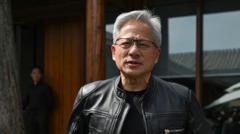Is Nvidia's CEO Disappointed by China's New Chip Ban?

Published: 2025-09-17 11:30:26 | Category: technology
Nvidia's CEO Jensen Huang has expressed disappointment over China's reported directive to halt purchases of the company's artificial intelligence (AI) chips. This action reflects ongoing tensions in the tech landscape, particularly as China aims to strengthen its AI capabilities and reduce reliance on American technology. Huang remains patient regarding the situation, emphasising Nvidia's commitment to supporting the US in resolving geopolitical challenges.
Last updated: 10 October 2023 (BST)
Key Takeaways
- China's Cyberspace Administration has reportedly ordered tech firms to stop purchasing Nvidia AI chips.
- Nvidia has previously faced restrictions on selling advanced chips to China, with some bans recently lifted.
- The ongoing geopolitical tensions between the US and China influence Nvidia's operations and market strategy.
- China is developing its own chips to compete in the AI space, aiming for greater self-sufficiency.
- Nvidia is heavily involved in the UK tech sector, including investments in data centres.
The Current Landscape of AI Technology and Nvidia's Role
Nvidia stands as a leader in the global semiconductor industry, particularly in AI technology. The company’s chips are crucial for powering everything from data centres to advanced AI applications. Huang's comments reflect a broader context where geopolitical tensions are increasingly influencing tech industry dynamics, particularly between the US and China.
Nvidia's Growth Amidst Challenges
Despite recent setbacks, Nvidia has experienced remarkable growth. Earlier in 2025, it became the first company to achieve a valuation of $4 trillion (£2.9 trillion). This monumental achievement underscores the company's significant role in the ongoing AI boom, as its chips are fundamental to the infrastructure that supports AI development globally.
China's Strategic Shift
China's decision to halt the purchase of Nvidia chips forms part of a broader strategy to enhance its domestic chip manufacturing capabilities. This move is indicative of China's ambition to rival the US in AI technology. The Cyberspace Administration's directive suggests a shift towards fostering local talent and resources, as the country seeks to become self-sufficient in the tech sphere.
Impact on Chinese Tech Companies
Major Chinese tech firms like DeepSeek, Tencent, and Alibaba have been significant consumers of Nvidia's products. The halt in purchasing Nvidia chips could potentially disrupt their operations and slow down projects reliant on advanced AI technologies. As these companies pivot towards alternative solutions, the impact on their innovation cycles and competitiveness remains to be seen.
Geopolitical Implications
The interaction between tech companies and government regulations exemplifies the complex geopolitical landscape. Huang's willingness to support US policies highlights the interconnectedness of national strategies and corporate operations. Nvidia’s operations are not just business decisions; they are also deeply intertwined with international relations and regulatory frameworks.
Nvidia's Response to Geopolitical Tensions
In light of these developments, Huang has reiterated his support for the US, indicating a preference for diplomatic resolutions over confrontational approaches. His comments during a press conference reflect a desire for cooperation amid rising tensions, suggesting that Nvidia remains committed to navigating these challenges while maximising its business opportunities.
Future Prospects for Nvidia and AI Technology
Looking ahead, the future of Nvidia and the broader AI industry may hinge on the resolution of current geopolitical tensions. The company's continued innovation and adaptation to changing market conditions will be crucial in maintaining its leadership position. Additionally, Nvidia's partnerships, such as its collaborative efforts in the UK, highlight the importance of international cooperation in tech development.
Investments in the UK Tech Sector
Nvidia's investments in the UK, including its role in the Stargate UK data centre, emphasise its commitment to expanding its footprint in Europe. Collaborating with firms like OpenAI, Arm, and NScale, Nvidia is poised to contribute significantly to the UK's AI ecosystem. This partnership not only strengthens Nvidia’s market position but also enhances the UK's standing in global tech innovation.
Conclusion
Nvidia’s current predicament serves as a reminder of the intricate relationship between technology and geopolitics. As major players like China and the US navigate these complexities, the outcomes will likely have lasting implications for the global tech landscape. How companies respond to these shifts will shape the future of AI and semiconductor industries.
In a world where technology continues to evolve rapidly, the question remains: how will the ongoing geopolitical tensions redefine the landscape of AI technology in the years to come? #Nvidia #ArtificialIntelligence #Geopolitics
FAQs
What led to China halting Nvidia chip purchases?
China's Cyberspace Administration reportedly instructed local tech companies to stop purchasing Nvidia chips as part of a strategy to enhance domestic chip production and reduce reliance on foreign technology.
How has Nvidia responded to the halt in chip sales to China?
Nvidia's CEO, Jensen Huang, expressed disappointment about the situation but indicated a commitment to supporting US policies while remaining patient as negotiations unfold.
What is the significance of Nvidia's valuation?
Nvidia became the first company to surpass a valuation of $4 trillion (£2.9 trillion), highlighting its pivotal role in the AI industry and its influence in the technology sector overall.
Which Chinese companies have been affected by this decision?
Major Chinese tech companies such as DeepSeek, Tencent, and Alibaba, which have relied on Nvidia chips for their operations, are likely to face disruptions due to the halt in purchases.
What does the future hold for Nvidia in light of these challenges?
As geopolitical tensions evolve, Nvidia's ability to adapt and innovate will be crucial for maintaining its market position and driving future growth in the AI sector.



